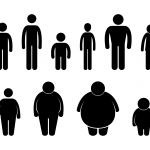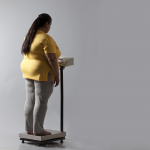How do we get people to make better food choices — to decrease the amounts of calories, fat and sugar in their diets? A new study examined the potential of restricting "unhealthy" food choices vs. incentivizing "healthier" choices, to influence purchasing practices of low-income Americans. The upshot: Both can work, especially in combination.
obesity
When trying to identify why many young children gain weight at an early age, schools often are criticized. But a new, large study indicates that schools are being unfairly implicated in this regard, and that significant weight gain is taking place at home -- specifically, during summers away from school.
Many Americans whose BMI puts them in the obese category either don't know it, or assume they're "just overweight." This misperception can lead to fewer consultations with healthcare providers, and less attention to dealing with the issue, according to a recent survey.
When it comes to food -- shopping for, eating and disposing of it -- it's surprising how lack of awareness frequently factors into each area. Apparently this was a recurring theme given the tepid news coverage following last weekend's World Food Day, coupled with a recent consumer survey regarding food consumption and waste.
It used to be that Type 2 diabetes was typically seen in people over 40. But with the obesity epidemic, the age of onset is often lower. A recent study found that bariatric surgery was more effective for both weight loss and remission of the disease in those whose disease had an earlier onset. It provides a good reason not to delay surgery.
It's widely believed that a low basal metabolism predisposes a person to weight gain and obesity. And it makes sense since a low BMR can be a substantial part of a sedentary person's energy expenditure. But a recent study couldn't find such a connection, so the old I'm fat because I have a slow metabolism excuse won't hold water, at least according to this study.
The CDC recently released data on the prevalence of tobacco use, and there's a regional pattern. Tobacco is most popular in Midwestern and Southern states, where roughly 20 to 25 percent of the population smokes. Meanwhile, as maps reveal, those same regions struggle with the highest percentages of people with obesity.
Last Monday marked the first debate of of three Clinton-Trump debates. Though no fits of any kind -- coughing or otherwise -- were thrown, the two presidential candidates did throw many jabs, as expected. But when Trump said her Democratic rival "doesn't have the stamina," it eventually led us to this question: Who does have the stamina?
Activity trackers of all sorts have become must-have piece of technology — the theory being that they can encourage people to move more. But can activity trackers added to standard behavioral interventions help people lose more weight and maintain the weight loss longer? A recent study says ... not so much.
Not many people in the UK, and probably in the US too, are aware that overweight and obesity are risk factors for several types of cancer. A new report from Cancer Research UK indicates that the majority of those surveyed were ignorant of that fact. This doesn't bode well for the economics of health care in the UK, and the same is likely true for the US since we're even fatter than our cousins across the pond.
Bariatric, or weight loss, surgery works. A severely obese person might lose 50 percent of his or her excess body fat in the first year after such surgery. One question that has lingered for decades is: How long do such effects last? Another is: Do people gain back the weight that they've lost and, if so, how quickly does that happen?
We've known for a while that excess body fat (as in overweight and obesity) can raise the risk not only of chronic diseases like diabetes, but also some types of cancer. A new report indicates that the number of types of cancer may be more than we have thought.











